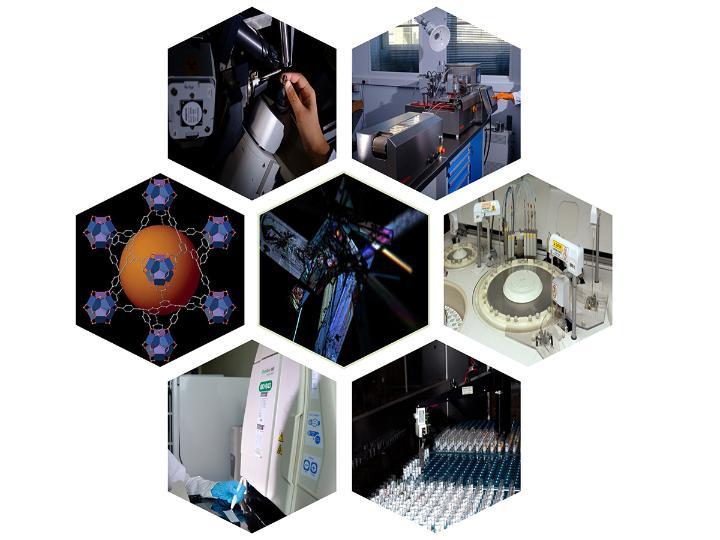The Interface of Chemistry, Biology and Materials
Overview
Research at the Interface of Chemistry, Bioscience and Materials aims to address some of the biggest challenges facing mankind in the 21st Century. These include combating infections, cancer and antimicrobial resistance and producing a greener and more sustainable world through sustainable manufacturing, managing plastic waste and clean energy. The work and concepts within these areas of molecular sciences underpin many of the technologies of our modern lives as well as developing understanding of ancient civilisations.
Our broad ranging expertise includes leading activities in chemical and structural biology, cell biology, genetics, materials chemistry, crystal engineering, supramolecular chemistry, nanomaterials, biomaterials, analytical sciences, medicinal and organic chemistry, microbiology, pharmaceutical technology, taphonomy and earth works and forensic entomology. However, effective high impact programmes often also involve our experts forming research teams with groups in engineering and health.
A key feature of our focus is to be open for business and a research without boundaries approach allows us to quickly develop teams to address opportunities in real world situations; including both innovation and problem solving projects in partnership with a wide range of industrial and community organisations.

Recent News
Associate editor: Solid State Chemistry (Frontiers in Chemistry)
Dr Venu Vangala has been appointed as Associate Editor for the specialty section of "Solid State Chemistry" with the journal Frontiers in Chemistry.
Internationalisation: Institutional networking with India
Dr Venu Vangala has set up an exchange programme between the ChemBioMat theme at FoLS Bradford and Hindustan Institute of Technology and Science (HITS) as part of the World Technology Universities Network (WTUN). Venu will pay an overseas visit to the HITS and lead an external partnership with HITS under the theme of ‘Affordable and Clean Energy’: Crystal Engineering of Functional Materials for Sustainable Energy and Pharmaceutical Applications. The WTUN has approved this two-phase (EoI and full application) funding application. The Operational Board Members for the WTUN programme are Prof Zahir Irani at the University of Bradford and Prof G. Illavazhagan at the HITS.
Commercialisation of novel technology
The has successfully commercialised its first cocrystal based innovation 'EfferShield'. The products will be on the market in the nutritional supplement and eco-cleaning sectors and will make an impact across manufacturing, healthcare, and the environment. To celebrate this success, Professor Gautam Desiraju, the world leader in the area of crystal engineering delivered a keynote address in a webinar on Friday, 29thApril at 1 pm.
PhD students scoop best Oral and Poster presentation awards at DMDG Early Career Meeting
The Drug Metabolism Discussion Group (DMDG) Early Career Meeting; “Hot Topics in the Lab” was held at Nottingham Trent University in May, for scientists in industry and academia in the early stages of their careers in DMPK (drug metabolism and pharmacokinetics). The DMDG (Drug Metabolism Discussion Group) is a network of DMPK experts from predominantly big and small pharma and biotech companies across the globe. This year’s meeting, co-organised and co-chaired by ICT Starter Fellow Dr. Francis Mprah Barnieh, brought together early career scientists from AstraZeneca, Novartis, Vertex, Signature, Merck KGaA, GSK, University of Dundee, UCB and many others. Reinforcing the ICT’s strong links with industry, the ICT and the University of Bradford also had a strong presence, with oral presentations and poster presentations by PhD students Athina Polykandritou and Alexandra Serre, along with research intern Herbie Garland (each supervised by Prof Robert Falconer and Prof Paul Loadman). Alex was awarded best oral presentation for her work on polysialyltransferase-targeted prodrugs for neuroblastoma, while Athina took the prize for best poster presentation for her work on MMP-targeted prodrugs. The awards were voted for by the 50+ delegates at the meeting. Congratulations!
New publications
Lila A. M. Mahmoud, Roberta A. dos Reis, Xianfeng Chen, Valeska Ting, Sanjit Nayak, (2023)
Metal-organic Frameworks as Potential Agents for Extraction and Delivery of Pesticides and Agrochemicals
ACS Omega, 2022, 7, 45910-45934. doi: 10.1021/acsomega.2c05978
Lila A. M. Mahmoud, Tayah C. Livesey, Maria Katsikogianni, Sanjit Nayak (2023)
Metal–Organic Frameworks and Their Biodegradable Composites for Controlled Delivery of Antimicrobial Drugs
Pharmaceutics, 2023, 15(1), 274, doi: https://doi.org/10.3390/pharmaceutics15010274
Thomas Swift (2023)
Peristomal Skin Complications: New Materials Needed to Ease the Ostomy Care Market
British Journal of Dermatology, 188: 455–456, doi: https://doi.org/10.1093/bjd/ljad006
Research expertise
The research in the Interface of Chemistry, Biology and Materials research theme comprises specific knowledge and expertise in a range of subjects. Please contact the research theme leads for more information or to discuss potential collaborations.
The key areas of our expertise are:
- Crystal and particle engineering
- Drug discovery & delivery
- Green chemistry/ clean energy
- Sustainable polymers
- Soft matter & biomaterials
- Structural chemistry & biology
More detailed information about these areas is available on our Interface of Chemistry, Biology and Materials research theme page.
Research Leads
The theme is led by a Director of Research and three deputies who are jointly responsible for the scientific direction of the theme.
Research theme members
The Interface of Chemistry, Biology and Materials theme consists of several research groups working together to perform collaborative, multi-disciplinary research.
Visit our Research theme members page.



